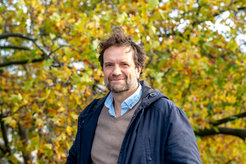"The idea of shared learning is highly attractive"
Interview with IMPRS coordinator Patrick Desplat
The International Max Planck Research School (IMPRS) “Global Multiplicity: A Social Anthropology for the Now” welcomes its first cohort in fall 2023. We spoke with coordinator Patrick Desplat about the unique opportunities the programme provides for doctoral students, as well as about the task of coordinating a joint undertaking of four research institutions: the MPI for Social Anthropology, Martin Luther University Halle-Wittenberg, Leipzig University, and Friedrich-Alexander-Universität Erlangen-Nürnberg.

Patrick, what do you do at the MPI and how long have you been here?
I joined the MPI in July 2023 as scientific coordinator of the new International Max Planck Research School (IMPRS) “Global Multiplicity: A Social Anthropology for the Now”.
And what is involved in coordinating the IMPRS?
Right now my task is to develop the organizational infrastructure of the research school. More generally, I coordinate scientific and administrative matters and make sure that the doctoral students feel welcome and receive good support and advising. And I am also involved in teaching.
What did you do previously?
I’m trained as an anthropologist and I taught and researched in this field before coming to the MPI. For the last two-and-a-half years, I held interim professorships in Göttingen and Münster.
What excites you about your new role as IMPRS coordinator?
It is an opportunity to help create and run an unusually large and ambitious doctoral training programme, which is a joint undertaking of the MPI and the universities in Halle, Leipzig, and Erlangen. This is the first time that four major research institutions have come together to establish an IMPRS. This constellation of course comes with organizational challenges – but it is also precisely what excites me about this task. I find it satisfying to see complex matters functioning smoothly and to enable a particular vision of anthropology to be passed on the next generation.
What vision of anthropology is this?
As a dialogic and comparative discipline that engages with societies in the present, anthropology is a key discipline that strives to respond to the urgent problems and questions that people in the world face today. Through empirical methods, it can develop a broad basis of knowledge which, in turn, is made available for future action. We provide people with possibilities to articulate their concerns in ways that were not available before. Therefore, I understand anthropology as a discipline that is inherently political. But we do not directly engage in politics ourselves.
What sorts of urgent problems and questions can anthropology shed light on?
All the big issues that humanity faces today and has grappled with in the past: How can we adapt to climate change? How do we manage deepening social divides? What are the long-term legacies of colonial rule and social inequality? Who decides who belongs and who doesn’t, and what is the basis for these identities?
Let’s return to the research school itself. What sets an IMPRS apart from other doctoral programmes?
Unlike many other paths to a doctorate, an IMPRS provides a combination of formal coursework, incorporation in international networks, soft-skills training, and support in career planning. Another key aspect is the academic supervision provided by thesis advisory committees. Instead of having just a single advisor, each doctoral student will receive guidance from three or four experienced scholars.
Who can apply to the programme?
Provided that the formal requirements for admission to a doctoral programme are met, anyone with a suitable disciplinary background and interest on the topics of our research programme is eligible to apply.
What advantages does a research school offer for doctoral students?
Structured training that goes beyond the individual research project. The idea of shared learning as part of a cohort is highly attractive: being able to share experiences and knowing that others are grappling with similar challenges creates a strong sense of community. It also enables doctoral students to start building international networks that will be invaluable for their future careers. And of course, an IMPRS also provides access to excellency in research.
What is special about the IMPRS at the MPI?
The IMPRS is notable for the breadth of the topics it will be tackling and the planned size of the school – up to 40 doctoral students.
How is the collaboration with the partner universities in Halle, Leipzig, and Erlangen organized?
The MPI is the organizational centre of the programme, but some events will of course be held at the other locations as well. This will ensure that all members are integrated in the ongoing activities of the IMPRS. In addition, the teaching faculty and the programme committee meet regularly to discuss practical matters and coordinate activities.
This sounds like a lot to coordinate! What about your own research? Do you still have time for your own projects?
Well, of course my energy and attention are dedicated to the IMPRS, so there isn’t any time to start new research projects of my own. But I hope to be able to bring some of my previous work to completion: for example, I am working on finalizing the book manuscript for my habilitation thesis, which looks at envy discourses among young people. I am also finishing an article on occult infrastructures – specifically examining how socio-material arrangements facilitate the circulation of rumors regarding shady and often violent activities in Madagascar, for example organ trafficking.
What happens now?
The courses for the semester are starting, the website needs to be updated regularly, and the IMPRS Spring School in March 2024 needs to be organized.
